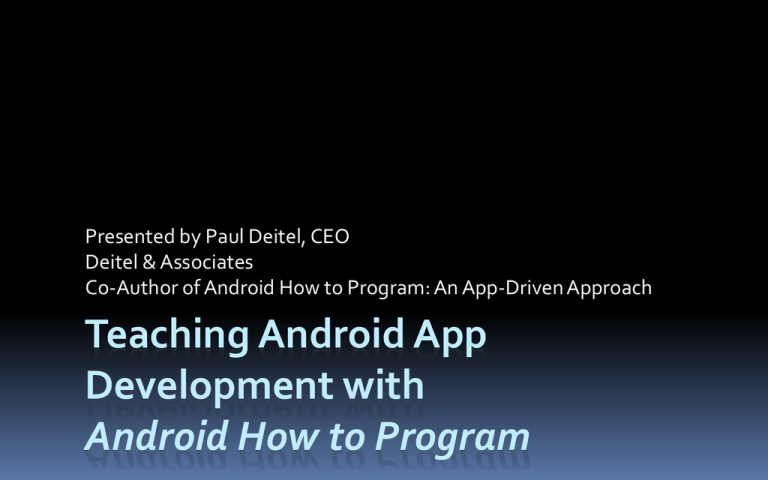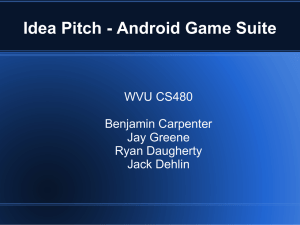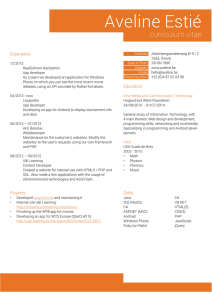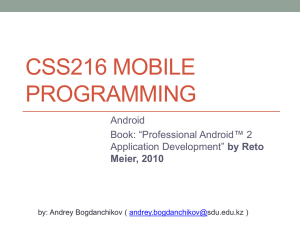
Presented by Paul Deitel, CEO
Deitel & Associates
Co-Author of Android How to Program: An App-Driven Approach
Teaching Android App
Development with
Android How to Program
Paul Deitel, CEO, Deitel & Associates
Email: paul.deitel@deitel.com
Web: www.deitel.com
Facebook: http://facebook.com/DeitelFan
Google+: http://gplus.to/Deitel
Twitter: @deitel
LinkedIn:
http://linkedin.com/company/deitel-&-associates
Source Code Downloads for the Book:
http://www.deitel.com/books/AndroidHTP
© Copyright 2012 by Deitel & Associates, Inc. All Rights Reserved.
Agenda
Android Quick Facts
Prerequisites for Teaching/Learning Android App
Development
Target Audiences for Android How to Program
Android How to Program Overview
Software Requirements & Setup
Android Development Tools Overview
Issues You May Encounter
Teaching Tips
Customer Service
© Copyright 2012 by Deitel & Associates, Inc. All Rights Reserved.
Android Quick Facts
Most widely used smartphone OS
Powers 52% of the US smartphone market
Phones, tablets, Google TV and more
Current version is Android 4.1 (Jelly Bean),
but is only 1.8% of the market
Version 2.2 is 12.9% of the installed base
Versions 2.3.3-2.3.7 are 55.5% of the installed base
Versions 4.0.3-4.0.4 are 23.7% of the installed base
© Copyright 2012 by Deitel & Associates, Inc. All Rights Reserved.
Prerequisites
You must know object-oriented Java programming
You must know XML
Used in GUI design and app settings
XML online tutorials
http://docs.oracle.com/javaee/1.4/tutorial/doc/
IntroXML2.html
http://www.ibm.com/developerworks/xml/newto/
http://www.w3schools.com/xml/xml_whatis.asp
http://www.deitel.com/articles/xml_tutorials/20060401/
XMLBasics/
http://www.deitel.com/articles/xml_tutorials/20060401/XMLSt
ructuringData/
© Copyright 2012 by Deitel & Associates, Inc. All Rights Reserved.
Prerequisites
Preparation time is essential
Build the apps yourself before teaching them
developer.android.com is important
http://developer.android.com/develop/index.html
Study the APIs/developer guides/sample code
Check out the new Android design guidelines
http://developer.android.com/design/index.html
© Copyright 2012 by Deitel & Associates, Inc. All Rights Reserved.
Target Audiences for Android How to Program
Upper-level elective college courses and industry
professional courses for people familiar with
object-oriented programming
May or may not know Java
“Honors” or “accelerated” CS1 courses
Schools that offer many sections of CS1 in Java could
offer one or two sections to ambitious students with
prior programming experience and who want to work
hard to master both Java and Android
Aggressively paced course
© Copyright 2012 by Deitel & Associates, Inc. All Rights Reserved.
Android How to Program Overview
Includes everything you need to teach Android
app development
Created this book by combining
Android content from Android for Programmers
Java content from Java How to Program, 9/e
Adding short answer exercises for the Android content
Adding suggested projects for the Android content
© Copyright 2012 by Deitel & Associates, Inc. All Rights Reserved.
Android How to Program Overview
App-Driven Approach
Concepts in the context of complete working apps
Each app chapter begins with
introduction to the app
test-drive
technologies overview
Detailed code walkthrough of the app’s code
Discusses the programming concepts
Demonstrates the functionality of the Android APIs
© Copyright 2012 by Deitel & Associates, Inc. All Rights Reserved.
Android How to Program Overview
Thinking like a developer from the start
Android Smartphone Apps
We cover many of the features included in the Android Software Development Kit
(SDK), including Bluetooth, Google Maps, the Camera APIs, graphics APIs and
support for multiple screen sizes and resolutions
Android Tablet Apps
Build lots of real stuff and face the kinds of challenges professional developers
must deal with
Online documentation and forums where you can find additional information
We cover many Android features for developing tablet apps, including property
animation, action bar and fragments
Android Maps APIs
The Route Tracker App uses the Android Maps APIs which allow you to
incorporate Google™ Maps in your app
© Copyright 2012 by Deitel & Associates, Inc. All Rights Reserved.
Android How to Program Overview
Multimedia
Android Best Practices
The apps use a broad range of Android multimedia capabilities, including
graphics, images, frame-by-frame animation, property animation, audio, video,
speech synthesis and speech recognition.
We adhere to accepted Android best practices, pointing them out in the detailed
code walkthroughs
Web Services
Web services allow you to use the web as an extraordinary collection of services—
many of which are free
Chapter 11’s Route Tracker app uses the built-in Android Maps APIs to interact
with the Google Maps web services
Chapter 14’s Weather Viewer app uses WeatherBug’s web services. The exercises
encourage you to explore the vast array of available web services.
© Copyright 2012 by Deitel & Associates, Inc. All Rights Reserved.
Android How to Program Java Content
Objects and classes early helps novice readers master these concepts
more thoroughly before attempting the object-oriented Android
material.
Introduces Java’s generic collections that are used frequently in our
Android treatment and for which Android has some similar classes.
Introduces multithreading fundamentals, showing the features that we
use in several of our Android apps—important for maintaining app
responsiveness
Introduces Java GUI development—Android provides its own GUI
components, so this appendix presents only a few Java GUI
components, focussing on event-handling techniques that are used in all
Android GUIs. The appendix introduces nested classes and anonymous
inner classes, which are frequently used in Android programming.
© Copyright 2012 by Deitel & Associates, Inc. All Rights Reserved.
Instructor Resources
PowerPoint slides containing only the code and
figures in the text
Test Item File of short-answer questions
True/False and Fill-in-the-Blank
Solutions Manual
For both the Java and Android content, solutions to the
end-of-chapter short-answer exercises
For the Java content, solutions are provided for most of the
programming exercises
Solutions are not provided for the suggested Android appdevelopment project exercises
© Copyright 2012 by Deitel & Associates, Inc. All Rights Reserved.
Software Requirements & Setup
Java SE 6 (not 7!) Development Kit
http://www.oracle.com/technetwork/java/javase/dow
nloads/index.html
Set the JAVA_HOME environment variable to ensure
that the correct JDK is used
Eclipse IDE for Java Developers
http://eclipse.org/downloads/
Eclipse 3.6.2 (Helios) or greater
Android SDK and ADT Plug-in
http://developer.android.com/sdk/index.html
© Copyright 2012 by Deitel & Associates, Inc. All Rights Reserved.
Software Requirements & Setup
Install Java SE 6
Ensure that your PATH and JAVA_HOME are configured
properly
Probably want to remove the CLASSPATH if your system
has one
Extract Eclipse
Run/Configure Eclipse
Specify where your workspace should be saved
Tabs/Indentation/Line Numbers
Window > Preferences > General > Editors > Text Editors
Mac: Preferences option is under the Eclipse menu
© Copyright 2012 by Deitel & Associates, Inc. All Rights Reserved.
Software Requirements & Setup
Install the Android SDK
http://developer.android.com/sdk/installing/index.
html
Contains only the tools, not the platforms/APIs
Installer will tell you which version of Java it
discovered; if it’s not the Java SE 6 SDK, you
MUST correct that before continuing
On Windows, install to c:\android-sdk—sometimes
paths with spaces cause issues
© Copyright 2012 by Deitel & Associates, Inc. All Rights Reserved.
Software Requirements & Setup
Install the Platforms
http://developer.android.com/sdk/installing/adding-
packages.html
Run the SDK Manager
Our book uses Android 2.3.3 through 3.2
Consider installing 4.x too
Install the ADT Plugin
http://developer.android.com/sdk/installing/installing-adt.html
Set up AVDs for Testing
Should have at least one smartphone and one tablet AVD
For real development, you’d have many so you can emulate a
wide range of real devices
© Copyright 2012 by Deitel & Associates, Inc. All Rights Reserved.
Android Development Tools Overview
Eclipse IDE
ADT Plug-In
Android Emulator and AVDs
Using real Android devices
On Windows, you might need to download and
install USB drivers for the specific device
Must enable debugging on the device
© Copyright 2012 by Deitel & Associates, Inc. All Rights Reserved.
Issues You May Encounter
Wrong version of Java
Eclipse can’t find the Android SDK
The Android development tools update frequently
Steps in any book are likely to be out-of-date quickly
XML files open in the wrong editor
Set in Window > Preferences > Java > Compiler
Updated tools
Set location in Window > Preferences > Android
Wrong Eclipse Java compiler compliance level
May need to set up JAVA_HOME environment variable
Right click the file and select the appropriate editor
AVD won’t launch
May need to use the command line emulator tools in the Android SDK’s tools folder to launch
© Copyright 2012 by Deitel & Associates, Inc. All Rights Reserved.
Teaching Tips
Ensure that your students understand Java OO
programming before getting into Android
Open your AVDs before you begin your lecture—they take a
very long time to load!
Test drive the app in an AVD or on an actual Android device
so the students understand the app’s purpose—remember,
some features are available only on devices
Overview the technologies that will be used in the app to
give the students some context
Devices are always the fastest way to test apps
© Copyright 2012 by Deitel & Associates, Inc. All Rights Reserved.
Teaching Tips
Developing an app can take weeks or months
Have students work in teams
Stanford Facebook app development course
http://www.stanford.edu/group/captology/cgibin/facebook/
Students worked in teams developing apps, some of
which landed in Facebook’s top 10, earning some of the
student developers millions of dollars
Course gained wide recognition for encouraging student
creativity and teamwork
© Copyright 2012 by Deitel & Associates, Inc. All Rights Reserved.
Customer Service
We're here to help!
Send comments and suggestions—these help
us improve future editions
© Copyright 2012 by Deitel & Associates, Inc. All Rights Reserved.
Contact Us!
Email:
paul.deitel@deitel.com
deitel@deitel.com
Web: http://www.deitel.com
Facebook: http://facebook.com/DeitelFan
Google+: http://gplus.to/Deitel
Twitter: @deitel
LinkedIn:
http://linkedin.com/company/deitel-&-associates
Code Downloads:
http://www.deitel.com/books/AndroidHTP
© Copyright 2012 by Deitel & Associates, Inc. All Rights Reserved.





